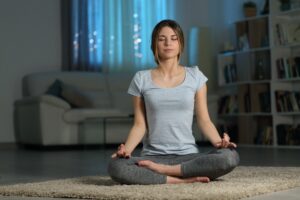Five techniques for a good night’s sleep

Here are some practical things you can do each evening to fall asleep better and get higher quality rest.
Why is achieving a good night’s sleep so difficult? For lots of us, life can be busy, and responsibilities and chores eat into the time we have to relax each evening. Screen time, unmanaged stress, over-caffeination and lifestyle habits all play a role in sending our circadian rhythm out of balance, making it harder to fall asleep and stay asleep through the night.
However, on the other side, good sleep hygiene, something that eludes most people, can go a long way to restoring this balance. This refers to any steps or practices that slot into your everyday routine and enhance your sleep quality, ensuring you wake up refreshed and ready to tackle the day! Wellbeing practitioners from Patina Maldives’ award winning FLOW Spa, have shared some expert tips to consider as you experiment with a sleep routine that works for you. These practical strategies, from dietary choices to relaxation techniques, will help you drift off more easily and enjoy a deeper, more restorative slumber.
Eat right and sleep tight
The timing of your dinner and snacks can significantly impact your sleep quality, far more than most of us realise. While a grumbling stomach can be distracting enough to keep you awake, an overly full stomach can play havoc with your sleep quality. So, the best approach is to eat your dinner two to three hours before bedtime and snack very lightly. If you must eat right before bed, a small, healthy bite, such as a piece of fruit and a slice of cheese, should keep you satiated until breakfast.
Some people find that incorporating certain foods into their evening meal and snacks can help them unwind and fall asleep faster. Kiwis, cherries, milk, fatty fish, nuts and rice are rich in nutrients that support the production of sleep-regulating hormones, making them perfect additions to any dinner or pre-bedtime snack.
Herbs and teas
Herbal teas like chamomile, lavender, valerian root, passionflower, lemon balm, ashwagandha, tulsi, ginger, and mint have long been revered for their calming properties. Each of these teas offer compounds that help you unwind and slow down, so drinking one cup about 45 minutes before bed should induce sleepiness. Experiment with which one works best for your body and treat yourself to a regular hot drink before bed. Not only will it chemically help you ease into bedtime, the routine will also begin to serve as a signal to your brain that it should get ready for sleep. Additionally, chamomile or lavender essential oils, when diffused in the air, release a subtle floral aroma that have a calming and relaxing effect on the mind. Incorporating your favourite of these into your nightly routine can create a soothing atmosphere in your bedroom, conducive to deeper rest.
Bedtime breathing
Activities that switch on the body’s natural relaxation response feel great and greatly improve sleep. Breathing exercises fall into this category and are an underrated tool for reducing anxiety and promoting relaxation before bed. When we’re experiencing stress, our sympathetic nervous system, responsible for the fight-or-flight response, is overly active. Due to hectic lifestyles, this happens more than you’d suspect, leaving you overstimulated at bedtime and not at all ready to transition into sleep. In more extreme cases where someone is ‘stuck’ in this state, they suffer with too much cortisol and adrenaline, often making them feel overdrawn throughout the day and overly alert at nighttime.
The 4-7-8 breathing technique, also known as the ‘relaxing breath’ can help. It involves a rhythmic pattern of inhaling, holding your breath and exhaling and has been shown to activate your parasympathetic nervous system. This system reduces sympathetic activity and is responsible for ‘resting and digesting’, putting your mind and body into a calm state where it is far easier for you to fall asleep. To practise, exhale completely through your mouth, then inhale quietly through your nose for a count of four, hold for a count of seven, and exhale slowly through your mouth for a count of eight. Repeat this cycle around six times before returning to normal breathing.
Progressive muscle relaxation
Progressive muscle relaxation (PMR) is a really effective method for reducing physical tension that you may be unknowingly holding in your body from the day. This technique involves tensing and then relaxing different muscle groups in the body. To do it, simply find a comfortable position either sitting or lying down in bed – just somewhere you won’t be disturbed for 10-15 minutes. Focus on each muscle group, tensing for five seconds while breathing in, then releasing and relaxing. Repeat the process for each of your muscle groups, starting with the muscles in your head, neck and face and then moving down to your shoulders, hands and arms, your back, stomach and legs. Repeat this process with any areas that still feel unrelaxed, gradually using less tension each time. This practice is so simple but can help you release the day’s stress and prepare your body for restful sleep.
A warm soak
Taking a hot shower or bath 90 minutes before bed can significantly improve your ability to fall asleep. Not only does the warm water help you unwind and release any physical aches and pains, as your body cools down afterward, it helps your circadian rhythm to signal that it’s time to sleep. This cooling-down process promotes a natural decline in your core body temperature, which is essential for falling asleep quickly and enjoying a deep, restorative sleep.
Image Credit: ShutterStock











Comments